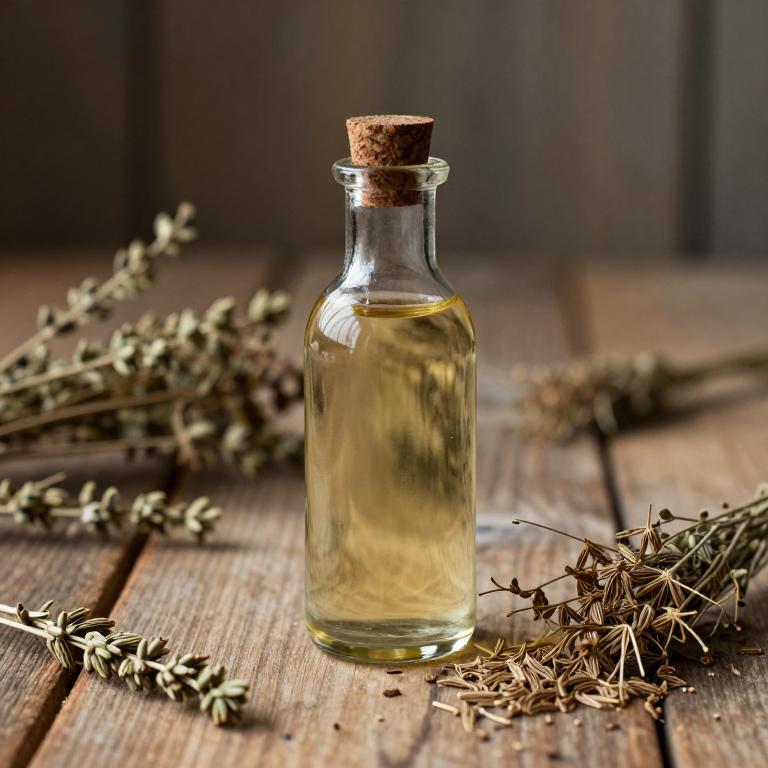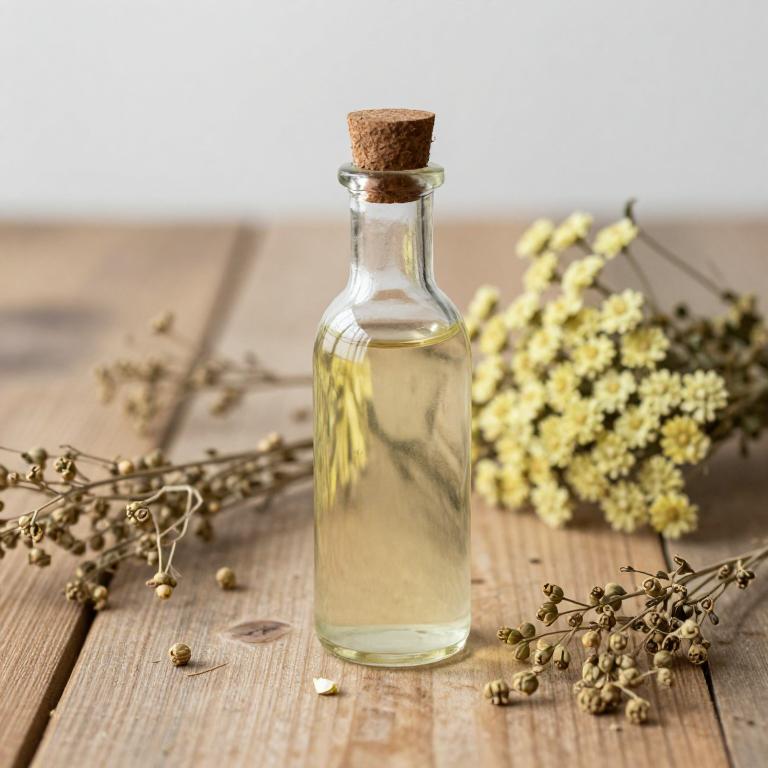10 Best Herbal Syrups For Diarrhea

Herbal syrups for diarrhea are traditional remedies that combine natural ingredients to soothe digestive discomfort and promote recovery.
Common herbs such as ginger, licorice root, and slippery elm are often included for their anti-inflammatory and soothing properties. These syrups work by reducing intestinal inflammation, easing cramping, and helping to restore fluid balance in the body. They are generally considered safe for most adults and children when used as directed, though they may not be suitable for individuals with certain allergies or medical conditions.
While herbal syrups can provide relief, they should not replace professional medical advice, especially in cases of severe or persistent diarrhea.
Table of Contents
- 1. Ginger (Zingiber officinale)
- 2. Ceylon cinnamon (Cinnamomum verum)
- 3. Black pepper (Piper nigrum)
- 4. Fennel (Foeniculum vulgare)
- 5. Cumin (Cuminum cyminum)
- 6. Turmeric (Curcuma longa)
- 7. Aloe vera (Aloe barbadensis)
- 8. Marshmallow (Althaea officinalis)
- 9. Licorice (Glycyrrhiza glabra)
- 10. Caraway (Carum carvi)
1. Ginger (Zingiber officinale)

Zingiber officinale, commonly known as ginger, has been traditionally used for its digestive benefits, and ginger herbal syrups are often recommended for alleviating symptoms of diarrhea.
These syrups contain concentrated extracts of fresh or dried ginger root, which possess anti-inflammatory and antimicrobial properties that may help reduce intestinal inflammation and combat harmful pathogens. The active compounds in ginger, such as gingerol and shogaol, can soothe the gastrointestinal tract and ease cramping associated with diarrhea. While ginger syrup is generally considered safe for most adults, it is advisable to consult a healthcare provider before use, especially for children or individuals with existing health conditions.
Overall, ginger herbal syrup can be a natural and effective remedy to support recovery from mild cases of diarrhea.
2. Ceylon cinnamon (Cinnamomum verum)

Cinnamomum verum, commonly known as true cinnamon, has been traditionally used in herbal syrups to help alleviate symptoms of diarrhea due to its antimicrobial and anti-inflammatory properties.
The essential oils in cinnamon, particularly cinnamaldehyde, can help reduce gut inflammation and inhibit the growth of harmful bacteria in the digestive tract. When prepared as a syrup, cinnamon is often combined with other soothing ingredients like ginger or licorice to enhance its therapeutic effects. This herbal remedy is typically consumed in small doses to help regulate bowel movements and ease discomfort associated with diarrhea.
While it can be a natural alternative for mild cases, it is advisable to consult a healthcare professional for persistent or severe digestive issues.
3. Black pepper (Piper nigrum)

Piper nigrum, commonly known as black pepper, has been traditionally used in herbal medicine for its potential digestive benefits.
When prepared as a herbal syrup, black pepper may help alleviate symptoms of diarrhea by stimulating the digestive system and improving gut motility. The active compound, piperine, is believed to enhance the absorption of nutrients and may have mild antimicrobial properties that support gut health. However, it is important to consult a healthcare professional before using black pepper syrup, especially for prolonged or severe cases of diarrhea.
While some anecdotal evidence suggests its effectiveness, scientific research on its specific role in treating diarrhea remains limited.
4. Fennel (Foeniculum vulgare)

Foeniculum vulgare, commonly known as fennel, has been traditionally used in herbal medicine to address digestive issues, including diarrhea.
Fennel herbal syrups are often prepared by steeping the seeds in water or alcohol to extract their essential oils and active compounds. These syrups contain compounds like anethole and fenchone, which possess antispasmodic and carminative properties that can help soothe the digestive tract. The mild flavor of fennel syrup makes it a palatable option for both adults and children.
However, it is important to consult a healthcare provider before using fennel syrup, especially for prolonged periods or in individuals with known allergies or medical conditions.
5. Cumin (Cuminum cyminum)

Cuminum cyminum, commonly known as cumin, has been traditionally used in herbal medicine for its digestive properties.
Cumin seed herbal syrups are often prepared by soaking the seeds in honey or sugar syrup to enhance their potency and palatability. These syrups are believed to help alleviate symptoms of diarrhea by improving digestion and reducing intestinal spasms. The essential oils in cumin, such as limonene and cineole, have mild antimicrobial and carminative effects that support gut health.
While cumin syrups may offer some relief for mild cases of diarrhea, they should not replace medical advice, and consultation with a healthcare professional is recommended for persistent or severe symptoms.
6. Turmeric (Curcuma longa)

Curcuma longa, commonly known as turmeric, contains curcumin, which has been studied for its anti-inflammatory and antimicrobial properties.
Herbal syrups made from curcuma longa are often used in traditional medicine to alleviate symptoms of diarrhea by reducing gut inflammation and combating harmful pathogens. These syrups are typically prepared by combining turmeric with honey or other natural sweeteners to improve taste and bioavailability. While they may offer some relief, it is important to consult a healthcare provider before using turmeric syrups, especially for prolonged or severe cases of diarrhea.
Overall, curcuma longa herbal syrups can be a complementary remedy, but they should not replace medical treatment when necessary.
7. Aloe vera (Aloe barbadensis)

Aloe barbadensis, commonly known as aloe vera, has been traditionally used for its soothing and healing properties, and its herbal syrups are sometimes used to alleviate symptoms of diarrhea.
These syrups contain mucilage, a gel-like substance that can coat the digestive tract and help reduce inflammation and irritation. While aloe vera may help regulate bowel movements and ease discomfort, it is important to note that it should not be used for prolonged periods or in high concentrations, as it can have a laxative effect. Some studies suggest that aloe vera may support gut health by promoting the growth of beneficial bacteria, but more research is needed to confirm its efficacy for treating diarrhea.
As with any herbal remedy, it is advisable to consult a healthcare professional before using aloe barbadensis syrup, especially for children or individuals with underlying health conditions.
8. Marshmallow (Althaea officinalis)

Althaea officinalis, commonly known as marshmallow root, has been traditionally used in herbal medicine to soothe digestive discomfort, including diarrhea.
The mucilage present in the root forms a protective layer over the gastrointestinal tract, helping to reduce irritation and inflammation. Herbal syrups made from Althaea officinalis are often used as a natural remedy to ease symptoms of acute diarrhea by promoting intestinal lining repair. These syrups are typically prepared by simmering the root in water and then reducing the liquid to a thick, viscous consistency.
While they may offer relief for mild cases, it is advisable to consult a healthcare professional for persistent or severe diarrhea.
9. Licorice (Glycyrrhiza glabra)

Glycyrrhiza glabra, commonly known as licorice, has been traditionally used in herbal medicine for its soothing properties.
Licorice root syrup is often employed to alleviate symptoms of diarrhea due to its anti-inflammatory and demulcent effects, which help calm irritated digestive tracts. The active compounds, such as glycyrrhizin and flavonoids, may reduce intestinal inflammation and enhance the protective mucus layer in the gut. However, prolonged use of licorice syrup can lead to side effects like hypertension and sodium retention, so it should be used under medical supervision.
Despite its benefits, it is not a primary treatment for infectious diarrhea and should complement rather than replace conventional therapies.
10. Caraway (Carum carvi)

Carum carvi, commonly known as caraway, has been traditionally used in herbal medicine for its digestive benefits, including the treatment of diarrhea.
Carum carvi herbal syrups are prepared by steeping the dried seeds in alcohol or water, creating a concentrated form that can be easily administered. These syrups are believed to help alleviate digestive discomfort by promoting healthy bowel movements and reducing intestinal spasms. The essential oils in caraway, such as limonene and carvone, may contribute to its soothing effect on the gastrointestinal tract.
While generally considered safe for short-term use, it is advisable to consult a healthcare professional before using carum carvi syrups, especially for prolonged or severe cases of diarrhea.